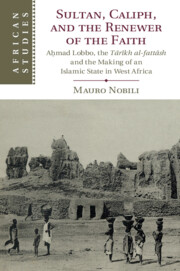 Sultan, Caliph, and the Renewer of the Faith
Sultan, Caliph, and the Renewer of the Faith from Part I - A Nineteenth-Century Chronicle in Support of the Caliphate of Ḥamdallāhi: Nūḥ b. al-Ṭāhir’s Tārīkh al-fattāsh
Published online by Cambridge University Press: 28 February 2020
This chapter addresses crucial historiographical, philological, and historical questions concerning the nature of the Tārīkh al-fattāsh, a widely circulated yet misinterpreted primary source for West African history. By reviewing a hundred years of scholarship on the topic and exploring West African manuscript libraries, the chapter demonstrates that the current understanding and uses of the Tārīkh al-fattāsh are radically impaired by scholars’ dependence on a defective colonial confection that passes as a critical edition produced by Houdas and Delafosse in 1913. This flawed edition and translation in fact conflates two different works: the seventeenth-century “Chronicle of the son of al-Mukhtār” and the nineteenth-century Tārīkh al-fattāsh written by the Fulani scholar Nūḥ b. al-Ṭāhir from the entourage of Aḥmad Lobbo, the funding leader of the Caliphate of Ḥamdallāhi.
To save this book to your Kindle, first ensure no-reply@cambridge.org is added to your Approved Personal Document E-mail List under your Personal Document Settings on the Manage Your Content and Devices page of your Amazon account. Then enter the ‘name’ part of your Kindle email address below. Find out more about saving to your Kindle.
Note you can select to save to either the @free.kindle.com or @kindle.com variations. ‘@free.kindle.com’ emails are free but can only be saved to your device when it is connected to wi-fi. ‘@kindle.com’ emails can be delivered even when you are not connected to wi-fi, but note that service fees apply.
Find out more about the Kindle Personal Document Service.
To save content items to your account, please confirm that you agree to abide by our usage policies. If this is the first time you use this feature, you will be asked to authorise Cambridge Core to connect with your account. Find out more about saving content to Dropbox.
To save content items to your account, please confirm that you agree to abide by our usage policies. If this is the first time you use this feature, you will be asked to authorise Cambridge Core to connect with your account. Find out more about saving content to Google Drive.